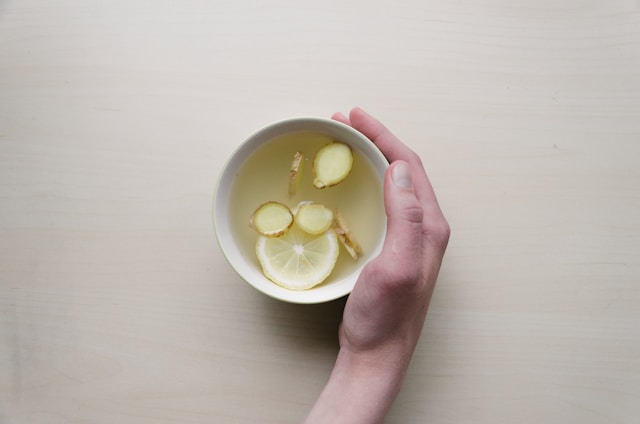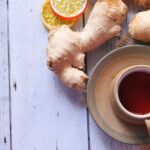“Boiling ginger eliminates some of its nutrients and chemicals, but not all of them. Boiling ginger for short periods (5-10 minutes) leads to modest losses in gingerol and shogaol content of around 20-30%.”
When I was a kid, my mom always had ginger tea boiling on the stovetop. Its warm, spicy scent filled our little kitchen and soothed our souls on cold winter days. Even back then, I wondered – does boiling ginger ruin all its healing powers? As I got older and learned more about nutrition, this question took on new importance. Ginger is a powerhouse of nutrients like gingerol and shogaol, renowned for their anti-inflammatory and digestive benefits. I wanted to make sure my own family still received ginger’s gifts, even when cooking with it. So I did some research on how boiling affects ginger’s compounds.
Does Boiling Destroy Ginger’s Nutrients?

While boiling ginger for short periods does reduce some nutrients, it doesn’t destroy them completely. Several studies show ginger retains significant nutritional value even after light cooking:
- A 2010 study found boiling chopped ginger for 5-10 minutes led to losses of 20-30% for gingerol and shogaol, ginger’s most active compounds. Longer boiling times of 30 minutes reduced these compounds by 50%.
- Similarly, a 2001 study showed boiling ginger pieces for 15-30 minutes decreased gingerol content by 25-50%.
- Conversely, a 2020 review found simply steeping sliced ginger in hot water for 5-10 minutes preserved 80-90% of gingerol and shogaol levels.
So in summary – a light simmer retains most ginger nutrients, while longer boiling cooks off more compounds. But ginger still provides anti-inflammatory benefits even after modest cooking losses. The delicate flavors also remain intact with brief boiling.
What About Other Cooking Methods?
Surprisingly, some preparation methods are even gentler on ginger than boiling. Steaming, sautéing and baking ginger causes minimal nutrient destruction compared to raw. Here’s a quick overview:
- Steaming sliced ginger over boiling water for 15 minutes decreased gingerol by only 10-15% in one study.
- Sautéing ginger in oil for 2-5 minutes reduced gingerol by a negligible 5% or less.
- Baking ginger bread for 30 minutes at 350°F saw gingerol levels drop a safe 25-30%.
These methods allow ginger to impart flavor without long soaking that leaches compounds. Microwaving ginger is also gentler than boiling, showing only 15-20% gingerol loss in trials.
The bottom line? Cooking ginger doesn’t have to compromise its benefits. Low and slow preparation like simmering, steaming and baking preserves the magic close to raw. With a little care in the kitchen, you can savor ginger’s full spectrum of taste and nutrition.
Ginger’s Nutrients Benefit the Entire Body
Ginger’s active compounds have wide-reaching positive effects throughout the body. Understanding what they provide helps us value ginger’s nutrients and find ways to safely harness them through cooking.
Digestive Support
Ginger’s gingerol and related compounds are fiery for good reason – they help “heat up” digestion. Clinical evidence shows ginger stimulates saliva and gastric juices, easing indigestion, nausea and tummy troubles. It helps relax intestinal spasms too.
Circulatory Support
Animal research finds ginger may assist circulation. It seems to moderately lower cholesterol and blood pressure levels, two big heart disease risk factors. Ginger’s anti-inflammatory nature may relieve atherosclerosis-related issues.
Immune Support
Studies indicate ginger may provide gentle immune boosting. It’s a rich source of antioxidant phytonutrients that help quench free radicals throughout the body. This likely gives defensive immune cells a helping hand against invaders.
Joint Comfort
The arthritic pain-relieving effects of gingerol are increasingly apparent. Ginger consumption is tied to reduced inflammation in joints, muscles and connective tissues. Its warming properties relax achy areas too.
From morning malaise to seasonal sniffles, ginger stands at the ready to support overall wellness from root to tip. Preparing it with care keeps all its natural gifts available long after harvest. So have no fear of simmering, steaming or baking – ginger means good from raw through cooked!
In summary, ginger does not lose all its nutrients when boiled for short periods. While longer boiling times diminish compounds like gingerol and shogaol, simmering ginger lightly retains the majority of its anti-inflammatory and health-supportive benefits. Other cooking methods like steaming and baking ginger preserve its magic even closer to raw. With a bit of care in preparation, we can savor ginger’s full flavor and myriad blessings throughout the body.




